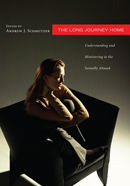A Charge for Church Leadership: Speaking Out Against Sexual Abuse and Ministering to Survivors, Part 1
Timid at first, tentative as it were, he began the long journey down the aisle toward the altar rail. I, too, began to walk, slowly, watching each step as I descended the stairs that led from the chancel to the nave and down the aisle. He was large-framed, older, with a look that I took as anger etched across his face. I was younger, rather inexperienced, and nervous. Yet, passion forced the powerful words from my mouth as I brought the homily that Sunday morning. We walked toward each other as the crowded cathedral filled with the sound of music. The notes and the melody engulfed each parishioner who stood to sing, rendering them unaware of our movements. They saw neither my fear nor his angst. As if the sun stood still, we moved in slow motion, the moment quickly approaching when we would stand face to face. My heart was racing. I felt afraid. Perhaps I had overstepped my bounds—suggesting that houses of worship be safe places to disclose the secrecy of abuse. And then it happened. He fell into my arms—no angry fist had he—and he wept and wept and wept. It was as if we were dancing—this man and I—as we shuffled together out into the vestry area. With an usher as our guide, we found a quiet space downstairs in a classroom. The lines in his aboriginal brow were deep, and at once I knew that they held the story of pain—of terror—from the days of his childhood. “I have never told anyone,” he began. “This is the first time I heard someone in God’s house say it was wrong!”1
Spiritual shepherds have the potential to enhance the healing journey of a man or a woman of faith whose life has been impacted by the *trauma of *sexual abuse (SA). Often, however, pastors, priests, and other religious leaders have neither ears to hear the cries for help nor eyes to see their suffering. As a result, they become an obstacle, rather than a resource, on the road to recovery. Clerical silence is taken as complicity with the acts of terror; their dismissal of the pain and despair perceived as one more indicator of rejection. God’s rejection. 
An excerpt from The Long Journey Home: Understanding and Ministering to the Sexually Abused, edited by Andrew J. Schmutzer.
Several terms, prompted by an asterisk (*), have been defined by pastors, therapists, and theologians that contributed to the book and are included in a select glossary. Please also continue the conversation with Andrew Schmutzer as he answers questions throughout this series.
In this chapter, we consider the powerful opportunity that clergy have to speak out against sexual abuse and to minister with compassion and *best practices to those who have been impacted by it. Drawing on our joint experiences, Nancy’s extensive research program on abuse in families of faith and Steve’s years of pastoral ministry, we weave together what we believe is an evidence-based charge to church leaders. Offering God’s care to those who are hurting—a cup of cold water in the name of Jesus—should be natural to the followers of Christ. Sometimes, though, we need to be reminded that our actions and our words bring forth God’s healing power in the lives of others. As church leaders, we need to learn to pair the practical act (i.e., cold water) with our mission (i.e., in the name of Jesus).
Category: Ministry, Pneuma Review, Winter 2014


